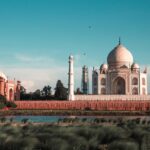New Delhi, 2025 — As India continues to consolidate its position as a global economic and democratic powerhouse, the nation faces a pivotal question: Who will lead India into the next phase of its democratic journey after Prime Minister Narendra Modi? With Modi’s tenure marked by decisive leadership and transformative policies, the anticipation surrounding his successor underscores the importance of a unified vision to carry India forward.
Modi’s Legacy: A Foundation for Unity and Progress
Prime Minister Narendra Modi’s leadership has been defined by bold initiatives aimed at fostering economic growth, infrastructure development, and social inclusion. From the success of Atmanirbhar Bharat (Self-Reliant India) to the international acclaim for India’s G20 presidency in 2023, his tenure has set a high benchmark for governance.
- Economic Transformation Modi’s government has overseen India’s rise as the fifth-largest global economy, with GDP crossing $4 trillion in 2024. Initiatives like Make in India and Digital India have driven innovation and industrial growth.
- Social Reforms Landmark policies like Swachh Bharat Abhiyan, Ayushman Bharat, and the Women’s Reservation Bill have addressed critical social challenges, aiming for inclusive development.
- Global Leadership Modi’s foreign policy, highlighted by alliances like the Quad and leadership in global climate initiatives, has elevated India’s international stature.
The Next Leader: Who After Modi?
The transition of leadership in a democracy as vast and diverse as India is both a challenge and an opportunity. Key contenders have emerged, each bringing unique strengths and visions for India’s future.
- Amit Shah As the Home Minister and a close ally of Modi, Shah’s administrative acumen and deep understanding of grassroots politics make him a strong candidate. His leadership in implementing policies like the abrogation of Article 370 in Jammu and Kashmir demonstrates his strategic capabilities.
- Yogi Adityanath The Chief Minister of Uttar Pradesh, Yogi Adityanath, has garnered significant support for his governance model, which emphasizes law and order and economic reforms. His appeal among the youth and rural populations positions him as a potential national leader.
- Nitin Gadkari Known for his efficiency in infrastructure development, Gadkari’s work on projects like Bharatmala Pariyojana has made him a respected figure in policy circles. His pragmatic approach and inclusive vision could resonate with a broad electorate.
- Rajnath Singh A seasoned politician with a strong base of support, Rajnath Singh’s experience as Defense Minister and his diplomatic acumen make him a potential consensus candidate for leadership.
Challenges for the Next Leadership
- Economic Equality While India’s economy has grown, disparities between urban and rural areas and among different socioeconomic groups remain. Bridging this gap will be a key focus for the next leadership.
- Youth Engagement With over 65% of the population under 35, engaging the youth in governance and addressing their aspirations will be critical.
- Balancing Nationalism and Inclusivity Ensuring that nationalism fosters unity without alienating minority groups will require nuanced policymaking and dialogue.
A Vision for the Future
The next leader must build upon Modi’s legacy while addressing emerging challenges. Key priorities for a unified and progressive India include:
- Strengthening Institutions Ensuring the independence and transparency of democratic institutions will reinforce public trust.
- Climate Action Expanding renewable energy initiatives and achieving net-zero emissions by 2070 will position India as a leader in sustainable development.
- Digital and Infrastructure Growth Accelerating digitization and infrastructure projects, especially in rural areas, will drive economic inclusivity.
- Global Diplomacy India’s leadership on the global stage must continue, advocating for equitable development and representing the Global South’s interests.
Conclusion
The promise of a unified India lies in its ability to adapt to changing times while staying true to its democratic ideals. As the nation looks beyond Narendra Modi’s leadership, the next leader will inherit a legacy of progress and a roadmap for continued growth. With the right vision, India’s future remains bright, embodying the spirit of democracy, unity, and resilience.




















